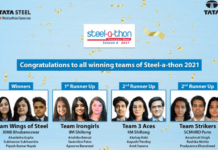All those students who aspire to do an MBA from the top B-schools of the country should first understand that there is no magical herb out there that will help them crack the common admission test or CAT. Only hard work, determination and practice will bear fruit.
A common myth that prevails is that the CAT exam and the selection procedure that follows in top-ranked IIMs is biased towards engineering students. There is no substantial proof of any such bias so far. Also, if one studies the pattern of the CAT exam, there is no indication of it being friendly towards engineering students in any way.
Yet, it is observed that all the toppers who score 100 percentile in CAT mostly come from an engineering background. Well, there may be some factors which enable students with an engineering background to score well in the examination.
Engineering students have the habit of sitting for long hours to study, given the fact that engineering is tough and challenging. Another determining factor is, that students coming from an engineering background are already adept at giving mock tests and appearing for competitive examinations. They start preparing for examinations, such as the JEE from class 11 onwards. They are generally considered to be good in maths and problem solving, which gives them an upper hand.
While these factors clarify that engineering students are better off at certain things, they do not in any way support the fact that CAT is an engineering-friendly examination. They only make an engineer a much more competitive candidate to attempt CAT.
It is true that non-engineering students find it tough to crack CAT. But there are students who have managed to score above 90 percentile and even 100 percentile despite coming from a non-engineering background.
What can give non-engineering students an edge?
Fast calculations – For non-engineering students, the most challenging section is Quantitative Aptitude(QA) which includes mathematics. Weakness in this section can be overcome only by practising and solving as many questions from the study material text books as possible. Another thing that can give non-engineering students an advantage is learning vedic maths, which can help in fast calculations and give them an edge.
Mock tests – Practising and reviewing as many mock tests and past question papers as possible is a must. This will help enhance confidence level and also give hands-on practice of how to manage time and accuracy during the exam.
Past working experience – Working experience of a year or two may not help candidates crack the MBA entrance exam, but it can certainly help give them an edge over the others, especially in the group discussion (GD) and personal interview (PI) rounds in the top B-schools of the country.
Time management – Candidates need to analyse their weak and strong points. Generally, verbal ability(VA) is the strongest point that non-engineering students possess and their weakest point is quantitative aptitude (QA). Therefore, it is important to allocate time for the practice of each section.
Make DILR your strong point – Data interpretation and logical reasoning (DILR) is considered to be an equaliser. Here, neither the engineering students nor the non-engineering students have an upper hand. Therefore, the latter can practise to score more in this section with accuracy, to beat the others.
Practice – Practice and hard work cannot be replaced. It is essential to try to manage time and get into the habit of sitting for long hours and studying diligently.
Value our content... contribute towards our growth. Even a small contribution a month would be of great help for us.
Since eight years, we have been serving the industry through daily news and stories. Our content is free for all and we plan to keep it that way.
Support HRKatha. Pay Here (All it takes is a minute)





































All are excuses the fact remains the same cat exam is only for engineers. They just want to earn money fro commerce students exam and application fees and so they allow them to give exams. If u are selecting students for management studies u must ask questions related to economy , decision making, partnership,market, consumer behaviour . But u ask trigonometry ,algebra and the height is geometry . So foolish to set such papers. Engineers cannot take decision for themselves then how can they take decision for any business . After spending so many year in engineering they suddenly decide they want to go in management .